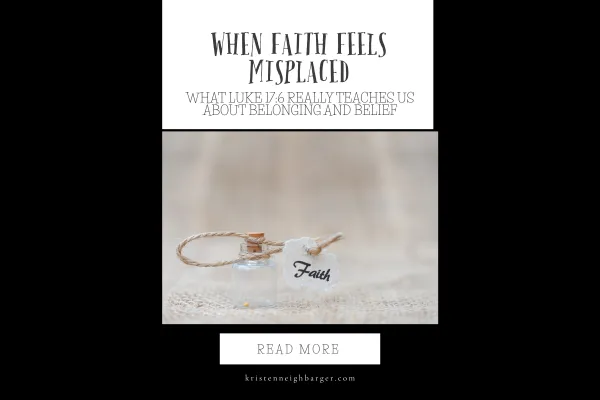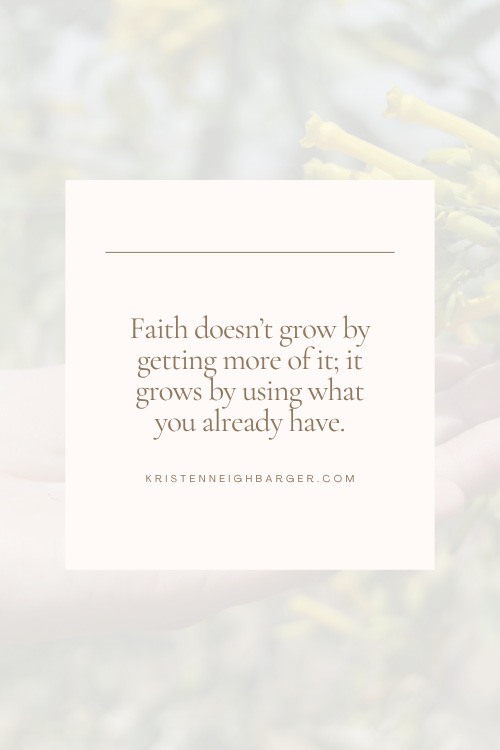
When Faith Feels Misplaced: What Luke 17:6 Really Teaches Us About Belonging and Belief
The Dishwasher Debacle
My brother is three years older than me. Growing up, we couldn’t have been more different.
Some of my most emblazoned memories of him from those early years involve his continued insistence that I was adopted, physical fights over board games, and a barrage of sarcasm- and passive-aggression-laden dinner conversations.
Growing up poor in the ‘80s meant the only dishwasher we had involved our four hands.
I hate doing dishes by hand.
I don’t understand how people can just immerse their hands into disgusting water full of other people’s food junk and not want to vomit immediately. In fact, I’m gagging right now just thinking about it.
Because we could never see eye to eye on anything, we were not a stellar dishwashing duo. More water ended up on the floor than on the dishes.
Our mom was a fan of attempting forced diplomacy in our sibling relationship. Consequently, when our dishwashing duties turned especially ugly, she resorted to the age-old discipline technique of sending us together to one of our rooms so we could work it out among ourselves.
Listen, I am not a parenting expert. I can tell you without a shadow of a doubt, though, that this technique is about as effective as sticking a lion and a gazelle in a cage, walking away, and just hoping for the best for both of them.
Needless to say, our conversations were never useful. No good ever came from them—nothing positive resulted except for excellent writing material.
Regardless of the amount of faith my mom had in the idealistic nonsense she’d read in some parenting magazine, no good was ever going to come of sending my brother and me to a room together to solve our relationship problems.
Reality should have told her she was putting her faith in all the wrong things.
A Faith Reality Check
Just like my mom needed a reality check for her faith in us, I think there are times when we need the same kind of reality check to make us assess who—and what—we’re putting our faith in.
Especially when it comes to faith in God versus faith in people or things we perceive as godly. We put our faith in them instead of in God and then wonder why nothing changes.

The Disciples’ Honest Response
Luke 17 opens with Jesus teaching his disciples about forgiveness and repentance among one another.
Their response is one of my favorites in the gospels.
They look at Jesus and tell him he’s going to need to increase their faith if repeated forgiveness and repentance in their relationships are a requirement.
We can laugh at this very human response even as we admit we probably feel the same way more often than we’d like to confess.
If you have even the smallest measure of faith, it would be powerful enough to say to this large tree, ‘My faith will pull you up by the roots and throw you into the sea,’ and it will respond to your faith and obey you.
—Luke 17:6 (TPT)
I can’t even count how many times I’ve heard pastors, teachers, and faith leaders talk about faith like a mustard seed, which is how the NIV translates this verse. Some of those teachings have been great, but others have left me scratching my head.
Too often, this passage has been used as an admonition for why good things aren’t happening for believers—or worse, as a weapon against individuals and organizations certain faith leaders didn’t agree with.
Rarely, though, is it ever referenced in the same context Jesus originally taught—relationally.
Faith, Forgiveness, and Unity
The theme running through Jesus’ teaching here is one of unity in the body. It’s about understanding that those you’re in close relationship with will mess up… repeatedly.
And when they do—and when you do—both repentance and forgiveness are necessary, over and over again.
When the disciples beg Jesus to give them more faith so they can have the strength to do this, Jesus tells them they don’t need more faith. Even the tiniest bit is enough to uproot the strongest trees.
Here’s the caveat: they had to use their faith—to uproot the tree, to forgive, and to reconcile.
Faith doesn’t grow by getting more of it; it grows by using what you already have.
Too often, we think we need bigger faith, but what we really need is to use the faith we already have—to trust God instead of grasping for faith in people, systems, or structures.

Misplaced Faith
We do it without even realizing it—when we blindly trust church leaders instead of Christ, or when we put our faith in institutions, policies, and programs instead of in the God who moves beyond them.
It’s so easy to get distracted by people, policy, programs, and performance. Before we know it, our faith becomes more aligned with them than in response to God.
Relationships within the body suffer because of it. Unity is destroyed as a result.
Why?
Because the hard truth is this—people, policy, programs, and performance will eventually disappoint and fail us.
People are imperfect.
Policies have holes.
Programs don’t serve everyone.
Performance looks good on the outside but is hollow on the inside.
For many of us, these very things are the culprits keeping us from finding our seat at the table. Yet, if we aren’t diligent, we can easily fall back into the habit of placing our faith in them again and again, instead of putting our faith in God and acting on that faith.
When Systems Fail, God Still Moves
When I start to get frustrated and angry at systems and institutions, God tends to remind me of the story of Esther.
I have a love-hate relationship with her story. There are so many things in it that make me want to scream, Smash the patriarchy! from the rooftops. Her life and circumstances are filled with one unfair thing after another. I’m not gonna lie—it’s definitely one of those stories I read and think, Seriously, God? This? There was no other way?
While I still haven’t shaken off those thoughts, I’m always humbled by the idea that perhaps Esther was made for such a time as that (Esther 4:14).
It renders me speechless every time I read it.
Her courage and example of utilizing her faith in God for her people remind me that even in unjust situations, God can make a way for justice and set a table for belonging.
Why? Because she was made for such a time as that.
Perhaps, So Were We
I can’t help but think this statement rings true for so many of us today. Perhaps we were made for such a time as this.
Perhaps this is our time to strip away our faith in people, policies, programs, and performance, and place it solely in God—then use it to uproot the mightiest of trees and build bigger, stronger tables.
My mom meant well when she sent my brother and me to one of our rooms to work out our issues. She did. But her faith should not have been in us.
Everywhere I look, the tables are getting smaller and smaller. Each seat is reserved and labeled invitation-only, requiring proof of membership.
Let this be our nudge to build bigger tables—tables open to relationship with everyone, tables we fill by utilizing our faith in God rather than our faith in men, policies, programs, and performance.
Faith uproots trees. Love builds tables.
So maybe this is our time—our precise moment to free ourselves from faith in the wrong things and open our hearts, minds, and actions to mustard-seed-sized faith in the God who teaches unity in the body and invites us to sit at bigger tables.
Perhaps, my friends, you were made for such a time as this.
What does mustard-seed faith look like for you right now?
Is there an area where God might be inviting you to re-root your faith—in Him, not in people or performance?
Take a few quiet minutes today to name where your faith feels misplaced, and imagine what kind of table God might build there instead.
